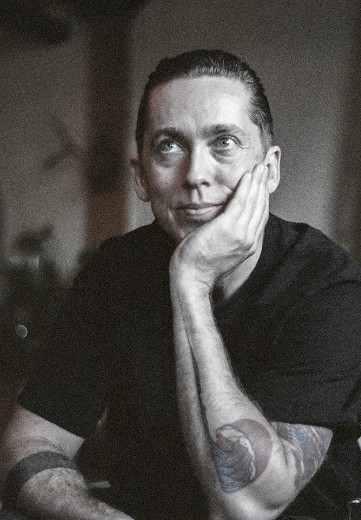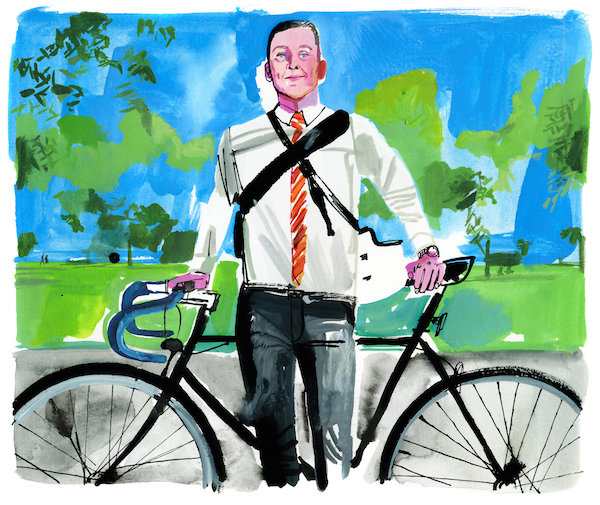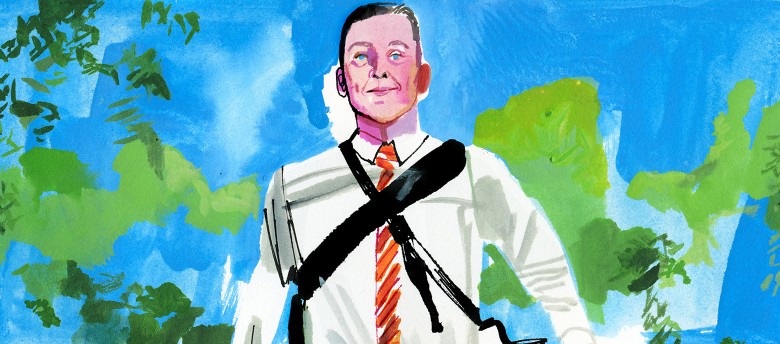On a wall inside David Shellnutt’s west-end Toronto law office, brightly coloured get-well-soon cards surround a black-and-white printout of all the medical treatment he’s received through OHIP. Two lines near the bottom are highlighted in yellow. “Moribund,” it says, then adds for good measure, “Patient not expected to live.”
Shellnutt only remembers a little about New Year’s Eve 2018 — kissing his partner, designer Allison Wood, in a bar at midnight; pushing open the door to leave; the first attacker coming toward him — but he won’t watch the surveillance footage that fills in the story. So here’s the rest of it: after he left the bar, two men in a car catcalled Wood; Shellnutt then threw a bag of trash at their vehicle; one of the men got out and began punching Shellnutt, who hit his head on the pavement when he fell to the ground, rendering him unconscious; at this point, the other man began attacking him. Shellnutt suffered two jaw fractures and an epidural hematoma that sent him into a coma for six days. “My surgeon excavated the blood from my brain,” he explains. “He said 30 minutes longer and I would have been gone.”

“It sounds cavalier, but I get to hit capitalist institutions where it hurts: in the wallet,” says David Shellnutt
Before the attack, Shellnutt worked at Scher Law, where he took on cases that blended human rights with personal-injury law, representing injured cyclists, sexual assault survivors and victims of police violence. He knew better than most lawyers the cataclysmic effects of a brain injury. “I have cycling cases where my clients sustained concussions in relatively minor crashes but are unable to work a year later,” he says. When he first woke from the coma, he feared his career was over.
Shellnutt’s family and friends were contending with fears of their own. “Dave has such a strong personality — he is not a wallflower,” says Lerners LLP associate Jennifer O’Dell, who attended Osgoode with Shellnutt and was called to the hospital by Wood on the night of the attack. “We didn’t know if he would be a shell of himself.”
Instead, he applied a single-minded determination to his recovery. A 365-days-a-year cyclist, he had to relearn how to walk. If the doctors said it — no drinking, minimum screen time, plenty of brain teasers — Shellnutt did it.
He also recognized, from his work with people who have suffered extreme trauma, that the biggest hurdle would not be physical. “I knew I was in emotional pain,” says Shellnutt. “Right away, I reached out to a psychotherapist.”
He eased back into work at Scher Law that spring, contacting the Toronto Rape Crisis Centre and Covenant House to offer pro-bono sessions on civil remedies for sexual assault. Then, in April, the Ford government announced it was shutting down the Criminal Injuries Compensation Board, a tribunal that adjudicated claims for financial help made by victims of violent crimes. “I would do full intake days for these organizations,” says Shellnutt. “By the September deadline, I had punched through 35 applications, including
my own.”
Shellnutt had always wanted to launch his own progressive practice, one that would focus on the work he felt most passionate about. So on December 31, 2019, exactly one year after the attack that almost ended his life, he opened The Biking Lawyer, with friends and family celebrating at his new office. Today, Shellnutt secures compensation for people who have been let down by the system — because their sexual assault cases were thrown out, because they were injured by the police, because they were sideswiped in a bike lane by more than a tonne of steel. “It sounds cavalier, but I get to hit capitalist institutions where it hurts: in the wallet,” he says. He figures if enough people lose enough money, the system might change.
The morning after he opened his firm, he ran to the lake to watch the sunrise, then returned home to propose to Wood. And three months after that, when the coronavirus forced Torontonians to shelter in place, Shellnutt mobilized more than 500 cyclists to deliver crucial supplies to vulnerable people. “Since the attack, I just feel like my empathy is on turbo drive,” he says. “There’s always more work to be done.”

Timeline of a personal injury lawyer
2009: David Shellnutt starts law school at Osgoode Hall.
2012: He articles at Lerners LLP.
2013: Shellnutt detours to Deloitte for seven months, conducting document review on commercial litigation proceedings.
2014: He moves to Gilbert Kirby Stringer LLP, working as an insurance-defence lawyer.
2015: Shellnutt is back at Lerners, where he represents plaintiffs in more than 60 personal-injury actions over two years. Soon, he begins to consider a change. “I was sitting in Durham, Ont., on an examination for discovery, on another rear-ender motor-vehicle accident collision, and I was like, ‘I’ve got to do something more.’”
2017: He joins Scher Law, where he pursues human-rights cases.
2019: After Shellnut is attacked on New Year’s Eve, a GoFundMe campaign raises nearly $80,000 to cover the bills during his recovery.
December 2019: On the last day of the year, Shellnutt opens his own practice, The Biking Lawyer.
This is a story from our Summer 2020 Issue.
Illustration by Lauren Tamaki; Photo by Teaunna Gray


